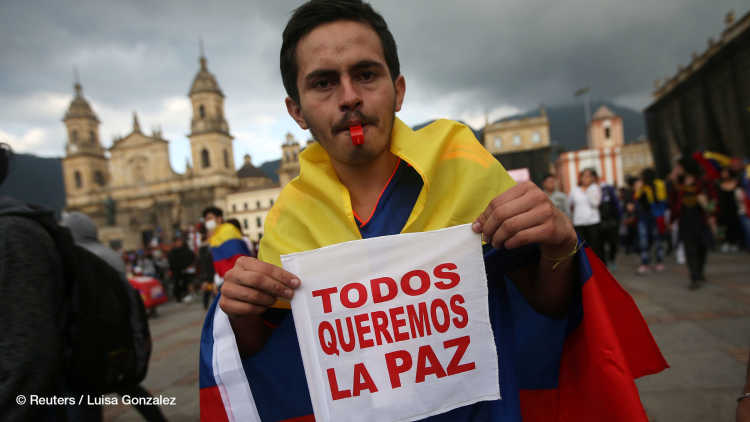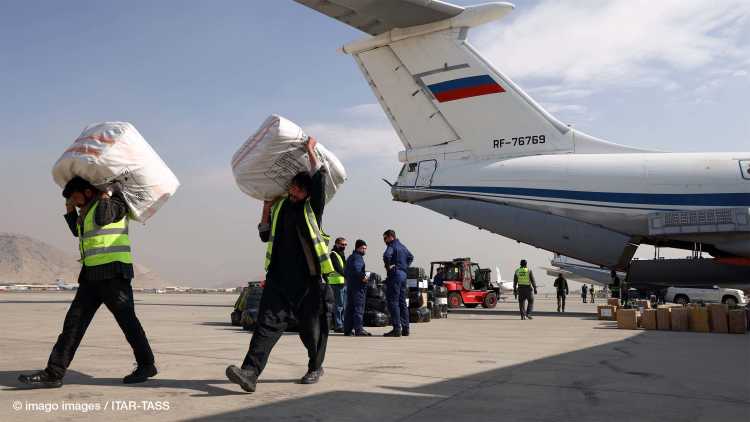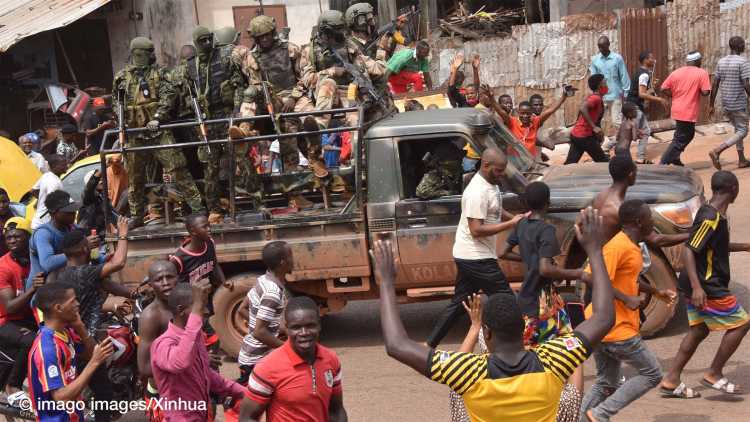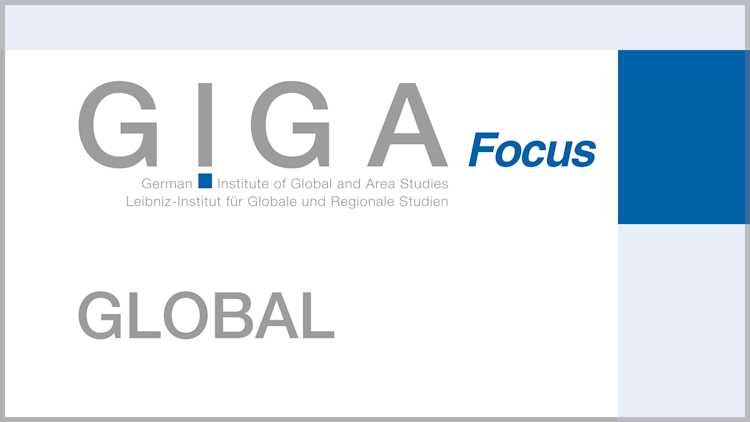- Home
- Publications
- GIGA Focus
- Aid in Unstable Times: Afghan Experiences and Future EU Engagement
GIGA Focus Asia
Aid in Unstable Times: Afghan Experiences and Future EU Engagement
Number 5 | 2025 | ISSN: 1862-359X

Over two decades, Afghanistan received USD 13 billion in EU development aid. Following the Taliban’s return in 2021, the German government’s Study Commission (SC) and Committee of Inquiry (CI) examined the failures and lessons to be learned. In addition, Afghan stakeholders, former officials, NGOs, and civil society actors shared insights on aid intervention that EU policymakers should consider.
The SC and CI reports highlight several critical challenges, such as a lack of contextual knowledge, warlords, widespread corruption, the Afghan government’s incapacity, and inadequate coordination both among donors and with recipients.
Supporting interviews, based on lived Afghan experiences, shed light on the broader picture to the EU’s aid intervention. The Bloc’s over-reliance on off-budget aid created a feeling among Afghans of being left marginalised in the state-building and national-reconstruction process.
However, increased on-budget aid between 2014 and 2019 proved a positive experience, significantly enhancing coordination, cooperation, and consultation between the EU and Afghan stakeholders; as such, it should be closely considered when crafting future aid policy.
Furthermore, the interviewees, considering the limited success of the 1990s, provided insight into the EU’s possible future engagement with Afghanistan. They highlighted that ideological change is a gradual process and the Bloc, through its established benchmarks, can support the Afghan people and bring positive change in the long run.
Policy Implications
The EU must leverage its benchmarks and presence by supporting NGOs and grassroots organisations. Unlike during the 1990s, many actors – including women-led NGOs – have remained active despite Taliban-imposed restrictions. Supporting these groups and agriculture could create rural employment, reduce poverty, and negate extremism. Bottom-up local initiatives are an effective way to nurture positive change in the long run.
German and Afghan Perspectives on Aid Intervention
Unlike other donors, after the collapse of the Afghan government in 2021 Germany made a commendable effort to reflect on its two decades of engagement with the country. Over two years of intensive work, including both closed and public hearings, the so-called Study Commission (SC) and Committee of Inquiry (CI) each thoroughly examined Germany’s civil–military engagement in Afghanistan. Their respective reports identified the manifold challenges posed by a lack of contextual knowledge, widespread corruption, weak institutional capacity, and warlords diverting aid to patronage networks, thereby making it less effective. The SC’s and CI’s findings offer valuable insight, providing a critical assessment of the complexity and limitations to international efforts in Afghanistan.
The conclusions of these two reports, empirical data, as well as insights derived from interviews offer cause for significant reflection. The latter were conducted with 20 key Afghan stakeholders between January and March 2024, including former government officials, NGO workers, and civil society actors; they offer a comprehensive and unique understanding of the successes and failures of aid interventions in Afghanistan to date. Former officials shared their views on state-level aid negotiations, institutional capacity, and tensions between donor demand and development priorities. In contrast, NGO representatives operate between donors and communities; they understand how projects are implemented on the ground, where plans often break down in the face of security contingencies. Civil society actors, including educators and community leaders, reflected on how aid interventions are perceived and experienced by ordinary Afghans.
The researcher’s ability to speak multiple Afghan languages was instrumental in obtaining rich and authentic insights from diverse groups of stakeholders, allowing candid conversations – even on politically sensitive topics that interpreters might have steered away from. With NGO workers who navigate between international and local spheres, switching between languages helped to engage in both development discourse and with the everyday realities faced by Afghans. For civil society actors, language proficiency is even more crucial, as their expressions of critique and hope are deeply embedded in colloquial or symbolic communication. Speaking in interviewees’ native tongues not only fostered trust but also allowed the nuance, emotion, and context frequently lost in translation to be captured. Further, retaining chosen wordings in their original language offers interpretive explanations exposing cultural underpinnings that are embedded – and thus only accessible – in their linguistic and social context. Highly nuanced analysis is possible herewith, as not only collating different perspectives but also deeply engaging with them on their own terms.
Broad Summary of Findings: German Government Reports
One of the central findings of the SC and CI reports is a significant lack of coordination between its own federal ministries, among international donor partners, and with Afghan state officials. Within Germany, strategic and political coordination across departments is inadequate. Ministries often pursue their own policies, leading to fragmented implementation and overlapping mandates (Study Commission Report 2024: 6; Committee of Inquiry Report 2025). At the international level, coordination among donors was deemed to be poor, with divergent priorities and approaches undermining coherent planning. Interviewees highlighted similar observations.
Further, the SC and CI reports acknowledge that the inclusion of warlords in the reconstruction of the new Afghan state without reconciliation or a process of transitional justice was one of the most far-reaching mistakes made by the international community. Moreover, donors – including the EU – favoured working with powerholders, warlords, and diaspora members, forming a parallel elite disconnected from Afghan society, resulting in massive capital flight (Study Commission Report 2025: 97). The mayor of Wardak Province, a participant in the Commission’s fact-finding study, affirmed that donors openly supported “arms barons, gangsters, smugglers, the mafia, and war criminals” (Study Commission Report 2024: 223). This underscores how donors including the EU, in their attempt to rebuild and stabilise the post-2001 Afghan government, made political compromises that ultimately undermined long-term development and stability. The SC and CI reports also note how the lack of checks and balances resulted in systemic corruption proliferating. For instance, one interlocutor stated that “we promoted corruption through the large flows of money” (Study Commission Report 2024: 240).
Another critical finding of these reports was donors’ core lack of contextual knowledge. Afghanistan was perceived as alien, and the laws and institutions promoted were modelled on Western systems without sufficient regard for Afghan traditions, cultures, or people’s actual needs. This led to rejection or indifference, especially in rural areas. Also mentioned was the fact that donors neglected key cultural knowledge, with this failure having a profound impact on legitimacy, sustainability, and local trust regarding their endeavours – as such, being central to the lessons to be learned when working with post-conflict states in future.
Afghan leaders have often asked for more on-budget support. However, the SC and CI reports do not discuss the issue of aid modality in detail. Accordingly, they do not offer up a practical way forward that embraces Afghan institutions, political and economic factors, or local involvement. Although the importance of local ownership and the relevance of local perspectives were highlighted by the SC and CI, there is limited consideration of Afghan experiences – and then ones related only to a handful of events. For example, the reports reference Afghan viewpoints primarily in relation to the Doha Agreement, the collapse of the country’s security forces and government, and the evacuation process. It is important to note that these are mostly recounted through the eyes of German officials or intelligence assessments, rather than engaging with Afghan voices directly. Thus there is a need for an in-depth, culturally sensitive assessment of Afghans’ own perspectives if their views on aid intervention are to be better understood and included.
The Main Problem with Off-Budget Aid
Donor support largely taking the form of off-budget aid significantly marginalised Afghan perspectives, primarily due to the lack of own involvement in the designing of related projects. As early as 2004, the Afghan government expressed concerns about donors – including the EU – being over-reliant on this aid modality, arguing that it would negatively affect the state-building process (Bizhan 2019). Furthermore, the Bloc’s excessive reliance on off-budget aid led to a brain drain away from government institutions by offering higher remuneration and creating a parallel public sector elsewhere, undermining the development of local state institutions. Initially, donors’ approach was justifiable, as Afghanistan lacked the institutional capacity to utilise allocated on-budget aid (Hassan 2023). However, instead of allocating aid based on capacity or helping expand government reach, the EU and others overly depended on the provision of off-budget aid.
Despite the Afghan government’s repeated requests at donor conferences to increase on-budget funding, over 80 per cent of the total aid allocated was in the form just described. Moreover, only a small portion of off-budget aid aligned with Afghan national priorities, undermining the sense of local ownership as well as overall effectiveness. Afghans were left marginalised, unable to play an active role in the development process. While the SC and CI reports recognise the importance of checks and balances being in place when it comes to managing off-budget aid, they do not directly address the UN’s reluctance to act as coordinator. The latter so doing is essential for delivering international aid in complex humanitarian and developmental contexts such as Afghanistan. In this regard, many interviewees argued that the lack of checks and balances provided space for corruption and overall inefficiency to proliferate.
فساد گستردهی در نهادهای غیر دولتی و برخی نهادهای مدنی کمک های توسعه را به یک کار پرسود تبدیل کرده بود چون پرسان و بازخاص نبود.
Translation: “The widespread corruption in NGOs and some civil society organisations [CSOs] had turned development aid into a lucrative business because there was no accountability.”
The phrase, pursaan wa bazkhas nabud means that everyone turned a blind eye to the needs of the people and the long-term priorities of the Afghan state. Concerns were raised regarding the effective management and transparency of aid allocated directly to NGOs and CSOs by donors. Interviewees also lamented the lack of checks and balances. One interlocutor remarked: “[Some institutions], despite lacking proper efficiency, successfully secured substantial funds.” This highlights how donors failed to ensure the rational allocation of aid to local and national organisations. Somelocalcivil society institutions “faced barriers in accessing aid” due to cumbersome application processes. Additionally, corruption among donor partners responsible for project implementation emerged as a major obstacle to overall effectiveness. The precedent of donors controlling 80 per cent of aid flows led to a lack of autonomy and undermined the credibility and legitimacy of the Afghan government.
Another challenge with off-budget aid was the accompanying influx of experts, consultants, and advisors, which undermined local capacity-building. The SC report mentions that foreign actors created a “second civil service” and consumed a large portion of the development aid allocated (Study Commission Report 2024: 136). Interviewees cited how some of these actors, while having good intentions, were often unfamiliar with the intricacies of the Afghan economic and political system as well as societal norms. Most experts followed Western notions of progress rather than considering Afghan priorities. A former Afghan government official emphasised:
اتکا به ظرفیتهای بیرونی در واقع دولت را در بخش ظرفیت سازی دخلی ناتوان ساخت.
Translation: “Over-reliance on external donor capacities weakened the Afghan state.”
In Dari, this is referred to as zarfiat hei bironi, which denotes over-reliance on external skills, talents, and experts who lack contextual familiarity; rather, indigenous talent and know-how should be fostered. Thus, foreign advisors appointed by donors to support various Afghan ministries not only failed to bring about positive change but also hindered the development of domestic capabilities. Sidelining realities on the ground, this undesirable dependence on external knowledge and skills failed to address the root causes of institutional weakness and further compromised the ability of the Afghan state to achieve good governance.
Further, significant pledges raised public expectations, while the subsequent gap between what was promised and what was actually disbursed led to widespread dissatisfaction. The SC (2024, 2025) and CI (2025) reports fail to address this mismatch. As one interviewee mentioned:
در کنفرانسها کمکهای زیادی وعده داده میشد که باعث افزایش انتظارات مردم میشد، اما در عمل، افغانها شاهد هیچ تغییر قابل توجهی در کشور نبودند.
Translation: “In conferences, huge pledges for assistance were made; but, in practice, Afghans did not see any changes in the country.”
In Dari, entezarat means “hope,” “anticipation,” “expectation.” The interlocutor’s words highlight the gap between grand promises and actual disbursements. The inconsistencies in the scale of aid pledges, commitments, and allocations impeded the government’s long-term planning. Interviewees noted that this disparity heightened “frustration” and led to disillusionment among Afghans, as only limited tangible progress was evident on the ground. Although USD 90 billion in aid was pledged at donor conferences for reconstruction, by 2010 less than two-thirds (USD 57 billion) had been disbursed; of that, 82 per cent bypassed the national financial system (Bizhan 2019). Further, donors continued to implement projects and programmes directly, without considering local realities.
In disregarding the particularities of the Afghan context, a significant amount of aid was utilised for initiatives such as workshops, despite them not being aligned with people’s own needs and priorities. The SC and CI reports do not explicitly cite the ineffectiveness of these events deliberately convened by donors including Germany and the EU. Therefore, a large amount of development aid was diverted to workshops aimed at promoting liberal-democratic values, such as gender equality and human rights, but often failed to consider cultural realities and the level of education of Afghans per se. As one conversation partner stated:
وارکشاپ های که برگزار شد نقص در تطابق داشت چون سطح دانش و درک مردم در نظر گرفته نشده بود.
Translation: “The workshops were often ineffective because the level of education and knowledge of the people were not taken into account.”
The phrase, noch dar tatabuk translates to “mismatch and lack of alignment.” This indicates the workshops were conducted in a top-down manner, rather than designed according to local conditions and actual needs. The person in question relays how these donor events were not helpful because Afghans lacked the necessary education to benefit from them.It reflects a broader theme to the interviews, namely the perception of a core lack of contextual knowledge on the part of donors. One interlocutor recalled their frustration with repeated sessions that felt detached from everyday realities, noting that “millions were spent, but no one asked how many of us could actually apply what we learned.” While the intent behind aid interventions may have been meaningful and well-placed, implementation lacked cultural and situational awareness. This highlights the importance of co-designing aid programmes together with local actors who understand on-the-ground challenges, needs, and priorities.
Post-2014: Increased EU On-Budget Aid
Following the completion of the UN’s mandate in 2014 and the withdrawal of international forces, security was gradually handed over to the Afghan government, requiring an increase in on-budget aid to the country. As Figure 1 below shows, this occurred post-2014 in the EU’s case. Its “Multiannual Indicative Programme” of that year committed EUR 200 million annually to on-budget aid to Afghanistan (European Commission 2014), later increasing to EUR 300 million after the “Cooperation Agreement on Partnership and Development” (CAPD) was signed in 2017.
Figure 1. Nature of On-/Off-Budget Aid to Afghanistan since 2004
Source: OECD (2025); graphic by Eduardo Valencia | T4T.
This funding was more aligned with the Afghan government’s own five-year plan (“Afghanistan National Peace and Development Framework”), as serving to reinforce a coherent agenda for peace, sustainable growth, job creation, basic social services, and institutional reform (CAPD 2017). Under the CAPD framework, the first Afghanistan-EU Joint Committee meeting was held in Brussels in 2018 between F. Mogherini and E. Hakimi. One interviewee stated:
برخلاف کمکهای خارج از بودجه، کمکهای داخل بودجه نیازمند تعامل مستقیم با نهادهای افغان بود که هماهنگی و مدل مشارکتی مبتنی بر مالکیت افغانها و پاسخگویی متقابل را تقویت میکرد.
Translation: “Unlike off-budget aid, on-budget forms require direct interaction with Afghan institutions, fostering coordination and a collaborative model grounded in Afghan ownership and mutual accountability.”
The quote suggests that donors in due course came to acknowledge the ineffectiveness of off-budget aid. This shift indicated a move towardsa more collaborative model, mutual accountability, and enhancing Afghan ownership of development initiatives. Further, the interviewee observed that increased on-budget aid enhanced coordination, mutual trust, and joint progress.
Additionally, in 2014, the EU included Afghanistan in the “Generalised Scheme of Preferences” (GSP), allowing the export of Afghan products to European markets. By 2017, the EU had become Afghanistan’s second-largest trading partner. In this regard, one interlocutor noted:
ش�مولیت در سیستم جی اس پی به تغییر هویت افغانستان از یک دریافت کننده کمک به یک شریک تجاری مشروع کمک کرد.
Translation: “GSP inclusion helped shift Afghanistan’s identity away from aid recipient towards legitimate trade partner.”
While the English translation captures the surface meaning, the original phrasing – particularly the word, mashroh – carries deeper connotations. In Dari, the latter can imply “equal,” “respect,” “trustworthiness,” “recognition,” “compliance,” or even “autonomy.” This layered meaning suggests that post-2014 the EU considered Afghanistan not only an aid recipient but also a partner able to offer something of value. As the interviewee further stated: “The EU complemented aid-based engagement with trade-based development cooperation.”
As a result, between 2015 and 2019 Afghanistan reached a number of significant milestones in economic terms. Notably, domestic revenue would increase from USD 1.3 billion in 2015 to USD 2.7 billion four years later (UNDP 2020: 5). This growth illustrates how aid alignment and genuine partnerships can produce tangible results, even in fragile contexts. However, the challenges posed by COVID-19 increased unemployment and left the Afghan government unable to pay police and army officers for months. Furthermore, the unilateral US and Taliban peace agreement in 2020, coupled with the withdrawal of forces without deploying UN peacekeepers, led to the collapse of the Afghan government and the Taliban’s return to power.
The EU’s Response to Taliban 2.0 and Future Engagement in Afghanistan
On 17 August 2021 the EU High Representative for Foreign Affairs, Josep Borrell, announced the Bloc’s decision to suspend on- and off-budget development aid to Afghanistan (Green 2021). Similarly, German Development Minister Gerd Müller declared the freezing of USD 250 million in aid designated for Afghanistan. However, the EU quickly made a policy U-turn to continue allocating off-budget aid to Afghanistan while bypassing the Taliban. On 24 August, the President of the European Commission increased aid to Afghanistan from EUR 50 million to EUR 200 million (Immenkamp 2021: 6). The following month, similarly, Germany also made a U-turn, allocating off-budget aid to the country once more and thus continuing to support the Afghan people. Further, the European Commission president announced a EUR 100 million conditional aid package based on benchmarks to encourage behavioural changes among the Taliban (Immenkamp 2021: 5). In October, the first face-to-face conversation between the US and EU delegations and the Taliban took place in Qatar, where the Commission pledged a EUR 1 billion humanitarian-aid package (European Commission 2021). In 2022, through the European Union External Action Service, the Bloc reopened its Kabul office (Reuters 2022).
Despite the EU’s efforts and international pressure, the Taliban 2.0 reimposed radical and oppressive policies, particularly ones restricting women’s education, employment, and recreational activities (Yousaf 2022). One interviewee recounted how the return of the Taliban also created many challenges for media bodies and CSOs:
بدون شک دوباره به قدرت رسیدن طالبان به جامعه مدنی آسیب زده است، بسیاری از رسانهها بسته شدهاند و انجمنها و نهادها اجازه فعالیت ندارند.
Translation: “Undoubtedly, the [re-]entry of the Taliban has devastated civil society: many media outlets have been shut down, and associations and institutions are not allowed to operate.”
Beyond the restriction of women’s rights, the Taliban’s return to power has posed many challenges for Afghan society – including the marginalisation of CSOs, media bodies, and other institutions that are critical for constructive political discourse in the country. Regarding the vital role of civil society in promoting societal well-being, the interviewee highlighted the Taliban’s extrajudicial imprisonment of Matiullah Wesa, who had advocated for a basic education programme for girls. A survey conducted by the Asia Foundation in 2019 (Akseer and Rieger 2019) indicated that all ethnic groups in Afghanistan, including the majority of Pashtuns, supported women’s rights to education and employment. It is evident that the Taliban do not fully represent the aspirations of Afghans as a whole and may uphold the geopolitical interests of external states instead. The Taliban seek to replicate the conservative tribal society prevalent in Pakistan’s Khyber Pakhtunkhwa province. Pakistani officials supporting the Taliban occasionally assert that the world should respect Afghan culture, which they claim does not allow women to study or work. While this assertion may hold true for Khyber Pakhtunkhwa, such cultural determinism overlooks Afghanistan’s multicultural and multilingual nature. As one conversation partner noted:
افراطگرایی و دگماتیسم بعنوان ابزار قدرت توسط همسایه ها در افغانستان معرفی شده است و اصول مدنی مورد قبول افغان ها را با جالش مواجه ساحته اند.
Translation: “Extremism and dogmatism have been introduced as tools of power by our neighbours, challenging the civil principles embraced by Afghans.”
In Dari, abzar qodrat means “tools of dominance.” This implies that neighbouring powers, particularly Iran and Pakistan, have deliberately and strategically promoted religious dogmatism as a way to expand their influence in Afghanistan, namely by providing financial and logistical support to the Taliban for two decades and counting. To counter extremism, the international community, particularly the EU, must remain engaged. Despite Taliban restrictions, many NGOs, especially those led by women, continue to serve local communities and are dedicated to promoting societal well-being. Interviewees stressed that pulling back from working with the Taliban is unlikely to produce positive outcomes in the long run. As one person spoken with observed:
هرقدر که ارتباطات جهان با طالبان کم شود، به همان اندازه آنها بیشتر تحریک میشوند و این کار در۱۹۹۰ آزمایش شد.
Translation: “The more the world reduces its engagement with the Taliban, the more they become antagonised – and this was tested in the 1990s.”
While the English translation captures the surface meaning, the original phrasing – particularly the word, tahrik – carries deeper connotations. In Dari, the latter can imply “provocation,” “agitation,” or even “a stirring up of vengeance,” suggesting emotional and political intensification rather than passive resentment. This layered meaning suggests that any EU disengagement risks not only policy failure but also a psychological backlash, potentially intensifying repression and closing spaces for civil society actors’ work. Interviewees warned that repeating the strategy seen in the 1990s could again isolate Afghans rather than protect them.
Another person spoken with commented:
رها کردن افغانستان به معنای تسلیم شدن در برابر ایدیولوژیهای افراطی مذهبی یا کمونیزم چین خواهد بود.
Translation: “Abandoning Afghanistan means surrendering to extremist religious ideologies and Chinese communism.”
In Dari, raha kardan has multiple connotations (“abandonment,” “isolation,” “leaving something behind”). The feeling of being left behind was prominent in other interviews, where it was expressed that we Afghans had no voice in the last two decades, even as regards the country’s internal matters. Those spoken with asserted that abandoning past achievements would further weaken the country, making it more susceptible to dogmatism and foreign ideologies, especially given China’s growing influence in the region. Such abandonment would further allow the Taliban to curtail individual, media, and civil society freedom, reversing the achievements of the last two decades – seeing Afghanistan not only be left behind in the military sense but also in a cultural one too.
Unheard Voices and the Silent Collapse of Afghanistan’s Rebuilding Promise
Among other things, behind the failure of the Afghan state-building experiment were: fragmented, top-down donor strategies; a lack of accountability; and, the inability to establish a concrete system of checks and balances for all parties involved. Moreover, over-reliance on off-budget funding without the UN acting as aid coordinator was another critical shortcoming, causing the duplication and overlapping of projects and programmes. Moreover, the single nation-led “Provincial Reconstruction Teams” approach, in the context of conflicting interests and differing strategic goals among donors, reduced the Afghan government's role to that of a bystander; ordinary people’s voices and perspectives were also unaccounted for. As such, Afghans experienced a lack of autonomy and ownership, which affected institution-building efforts at both the national and provincial levels. Nonetheless, the short period of increased on-budget aid after 2014 proved effective and improved coordination. Although the Afghan government made significant progress in various sectors, the COVID-19 pandemic significantly increased unemployment and posed challenges to EU–Afghanistan cooperation. Additionally, the Afghan government struggled, as noted, to pay police and army officers for several months. Meanwhile, on 29 February 2020, the US and the Taliban reached a unilateral peace agreement in Doha. Consequently, the rapid withdrawal of international forces, without ensuring the minimal presence of sufficient personnel or UN peacekeeping forces to facilitate reconciliation between the government and the Taliban, resulted in the latter’s return to power on 15 August 2021, reversing many past achievements.
The Long Road Ahead
The insights generated from the respective interviews as well as the SC (2024, 2025) and CI (2025) reports make clear the need for continued international – particularly German and EU – aid intervention if local civil society actors are to be supported and their resilience bolstered. Given the challenges associated with off-budget aid, such as corruption, capital flight, and the overlapping/duplication of projects, the Bloc should adopt a bottom-up and locally sensitive approach addressing the past shortcomings of this modality. Further, in light of the positive impact coming with on-budget funding between 2014 and 2019, it is imperative that policymakers pursue a more balanced allocation of development aid in their future engagement with Afghanistan or similar conflict and post-conflict settings. Should the Taliban eventually meet all the benchmarks established by the EU, it is recommended that the latter adopt a more balanced approach to the aid modalities employed – in other words, embrace on-budget funding more readily in future.
Further, to enhance the effectiveness of donor work in highly challenging environments the EU should actively support the UN in its role as the primary coordinator of development aid. This has the potential to minimise the duplication of efforts and better align donor resources with recipient priorities. To address the critical issue of accountability, a significant factor in the failure of state-building efforts in pre-Taliban Afghanistan, a robust system of checks and balances should also be implemented. All parties involved in aid distribution and management should fall under its auspices. To enhance transparency, with one option being the channelling of off-budget aid via NGOs, a tripartite audit mechanism involving the UN, the Afghan government, and donors is recommended. This can provide comprehensive oversight, potentially helping prevent capital flight as well as curb corruption and the misuse of resources.
Moreover, the EU should support the skill developments of local talent to strengthen national systems and institutional capacity. The Bloc should prioritise retaining local professionals within the recipient country rather than resettling key personnel in donor ones. This approach ensures that critical expertise remains where it is most needed. Further, the EU should intermittently refine benchmarks to incentivise behavioural change on the part of the Taliban. Conditional aid should be continued and strategically expanded within a nuanced, context-sensitive framework that reflects Afghan realities and incorporates local perspectives. Unlike before, Afghan voices should be given due weight in the design and implementation of EU projects to promote local ownership, with mid-term evaluation to address contingent challenges.
Two areas where the EU could provide vital support are: Despite Taliban restrictions, first, women-led NGOs continue to serve local communities and are committed to nurturing societal well-being. The EU should leverage its presence on the ground and expand direct support to existing women-centred and women-led organisations. Since 2021 the Taliban have, as noted, imposed radical and oppressive policies, particularly ones restricting women’s education, and employment, and recreational activities. As a result, women’s employment has dropped from an estimated figure of 21 per cent before the government’s collapse in 2021 to a historic low of below 5 per cent at the time of writing. To preserve the achievements made by the EU and others over the past two decades as regards women’s empowerment, policymakers should actively support these women-led initiatives going forwards.
Second, European policymakers should consider prioritising aid to rural areas, agriculture projects, and related programmes. Doing so would help address the pressing challenges currently facing around two million forced returnees from Iran and Pakistan post 2021. Aid directed here can help reduce acute unemployment and extreme poverty, while simultaneously countering opium production and extremism – thereby ensuring food security and fostering social stability in the long run. The EU should focus here on supporting irrigation projects, novel farming techniques, cold-storage facilities, and local agrobusiness initiatives. This would help stimulate local entrepreneurship, contributing to the emergence of a sustainable agricultural sector able to undergird social progress over time.
Acknowledgement
The author gratefully acknowledges the financial support provided by the Gerda Henkel Foundation for this research project.
Footnotes
References
Akseer, Tabasum, and John Rieger (eds) (2019), A Survey of the Afghan People: Afghanistan in 2019, The Asian Foundation, accessed 20 June 2025.
Bizhan, Nematullah (2019), Aid Paradoxes in Afghanistan: Building and Undermining the State, New York:Routledge.
CAPD (2017), Cooperation Agreement – on Partnership and Development between the European Union and Its Member States, of the One Part, and the Islamic Republic of Afghanistan, of the Other Part, in: Official Journal of the European Union, 14 March, accessed 26 April 2025.
Committee of Inquiry Report (2025), Beschlussempfehlung und Bericht des 1. Untersuchungsausschusses der 20. Wahlperiode gemäß Artikel 44 des Grundgesetzes, Deutscher Bundestag, Drucksache 20/14700, 18 February, accessed 25 March 2025.
European Commission (2021), Afghanistan: Commission Announces 1 Billion Afghan Support Package, 12 October, accessed 15 April 2025.
European Commission (2014), EU Development Cooperation Instrument: Multilateral Indicative Programme for Afghanistan 2014–2020, Islamic Republic of Afghanistan, European External Action Service, accessed 5 August 2025.
Green, Andrew (2021), EU, Germany Cut Off Development Aid to Taliban-Controlled Afghanistan, 18 August, accessed 17 April 2025.
Hassan, Oz (2023), Afghanistan: Lessons Learnt from 20 Years of Supporting Democracy, Development and Security, European Parliament, Policy Department for External Relations, Directorate General for External Policies of the Union, PE 702.579, January, accessed 14 April 2025.
Immenkamp, Beatrix (2021), The Situation in Afghanistan: Essential Benchmarks for EU Engagement, European Parliamentary Research Service, PE 698.019, September, accessed 15 April 2025.
OECD (2025), OECD Data Explorer, accessed 25 June 2025.
Reuters (2022), European Union Re-Establishes Physical Presence in Afghanistan, 21 January, accessed 19 April 2025.
Study Commission Report (2025), Abschlussbericht der Enquete-Kommission Lehren aus Afghanistan für das künftige vernetzte Engagement Deutschlands, Deutscher Bundestag, Drucksache 20/14500, 27 January, accessed 28 March 2025.
Study Commission Report (2024), Zwischenbericht der Enquete-Kommission Lehren aus Afghanistan für das künftige vernetzte Engagement Deutschlands, Deutscher Bundestag, Drucksache 20/10400, 19 February, accessed 25 March 2025.
UNDP (2020), Afghanistan: Covid-19 Socio-Economic Impact Assessment, UNDP Afghanistan, 11 November, accessed 15 August 2025.
Yousaf, Farooq (2022), Bringing Afghan Women to the Table: How to Negotiate with the Taliban, GIGA Focus Asia, 2, Hamburg: German Institute for Global and Area Studies (GIGA), accessed 14 August 2025.
Editor GIGA Focus Asia
Editorial Department GIGA Focus Asia
Regional Institutes
How to cite this article
Yosufi, Nazir Ahmad (2025), Aid in Unstable Times: Afghan Experiences and Future EU Engagement, GIGA Focus Asia, 5, Hamburg: German Institute for Global and Area Studies (GIGA), https://doi.org/10.57671/gfas-25052
Imprint
The GIGA Focus is an Open Access publication and can be read on the Internet and downloaded free of charge at www.giga-hamburg.de/en/publications/giga-focus. According to the conditions of the Creative-Commons license Attribution-No Derivative Works 3.0, this publication may be freely duplicated, circulated, and made accessible to the public. The particular conditions include the correct indication of the initial publication as GIGA Focus and no changes in or abbreviation of texts.
The German Institute for Global and Area Studies (GIGA) – Leibniz-Institut für Globale und Regionale Studien in Hamburg publishes the Focus series on Africa, Asia, Latin America, the Middle East and global issues. The GIGA Focus is edited and published by the GIGA. The views and opinions expressed are solely those of the authors and do not necessarily reflect those of the institute. Authors alone are responsible for the content of their articles. GIGA and the authors cannot be held liable for any errors and omissions, or for any consequences arising from the use of the information provided.























